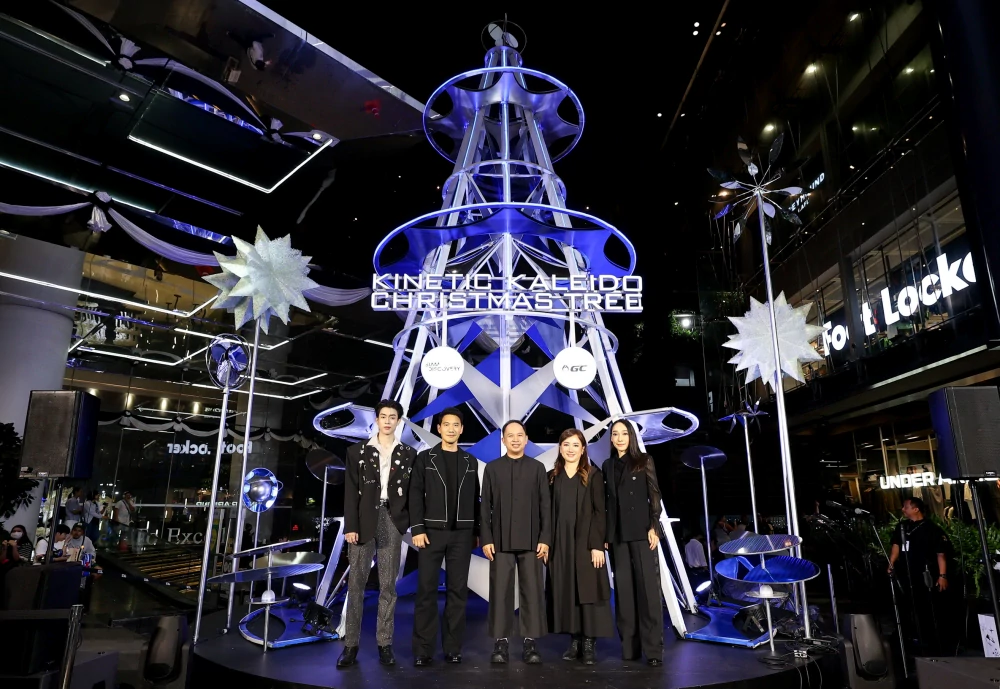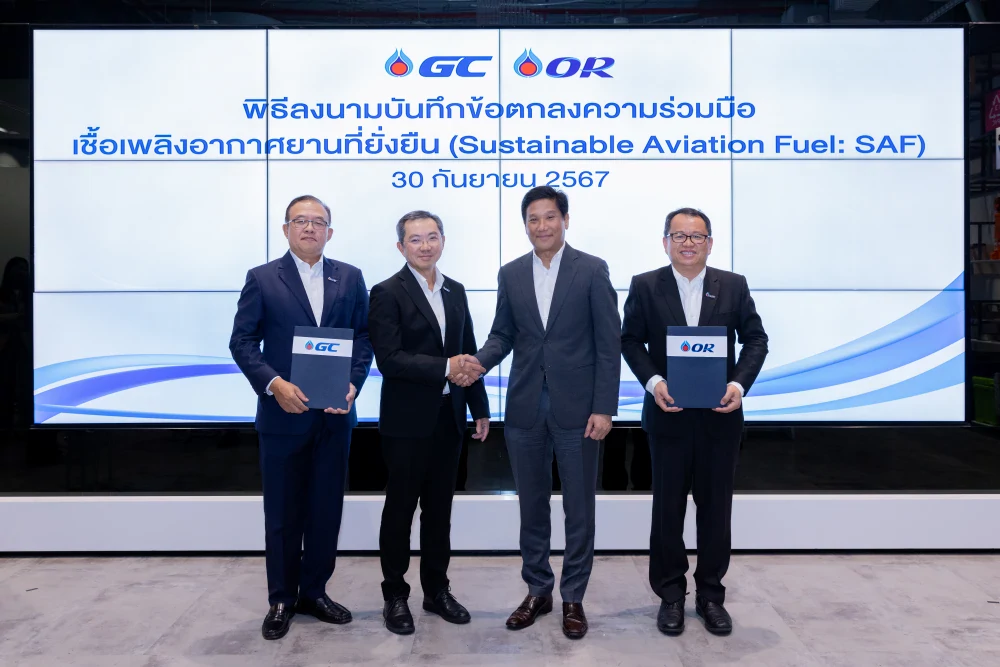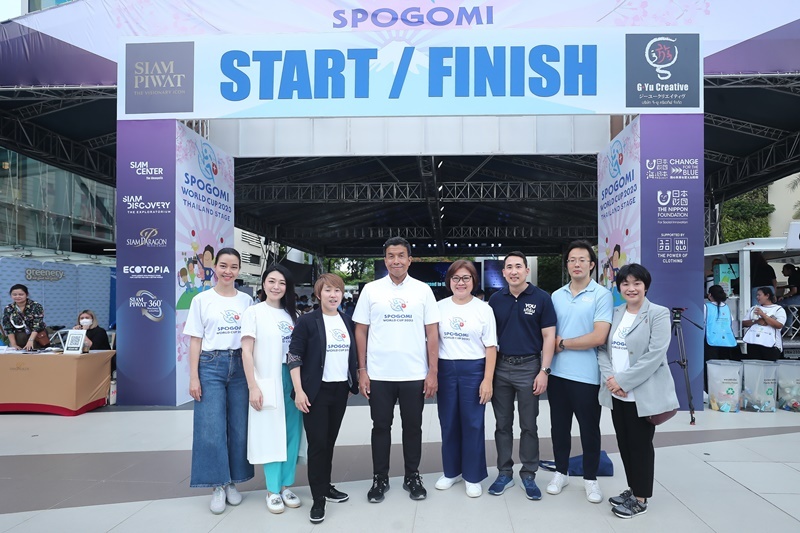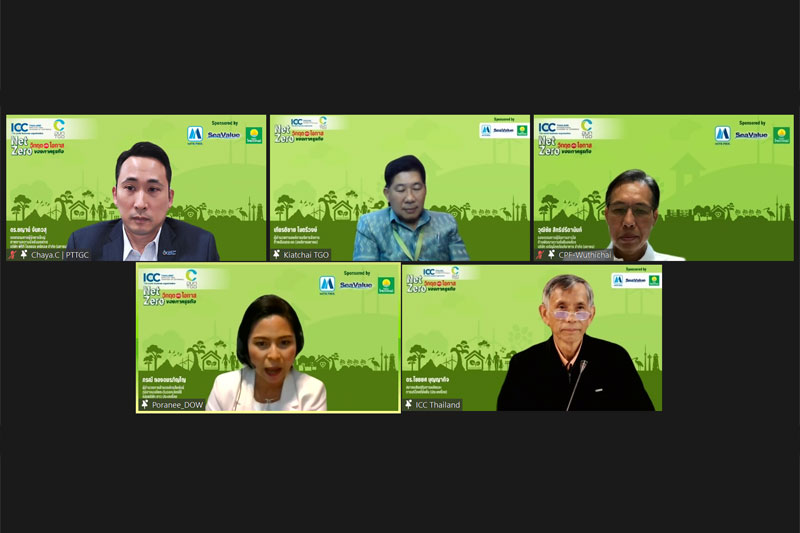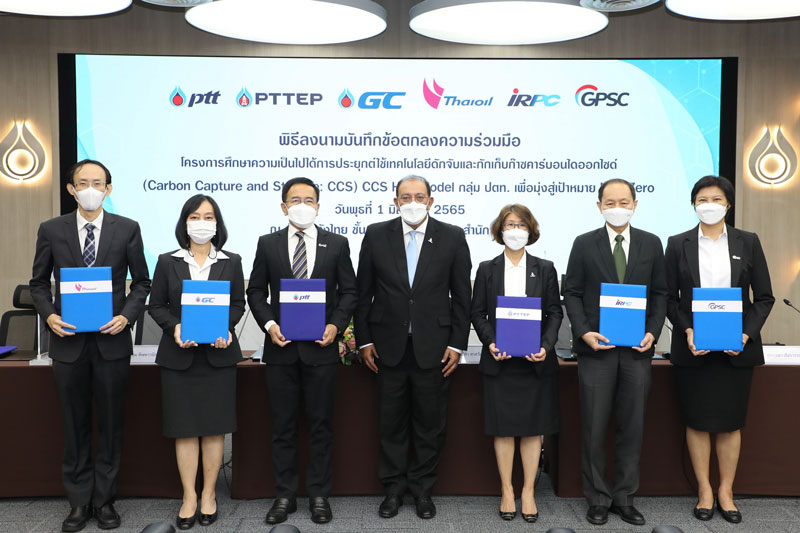News
P&G collaborates with GC to deliver the "Upcycling Plastic House" made from recycled materials, promoting sustainability and equality. Together with partners Sansiri, Lotus’s, and Habitat Group, they continue to uphold the sustainability vision.
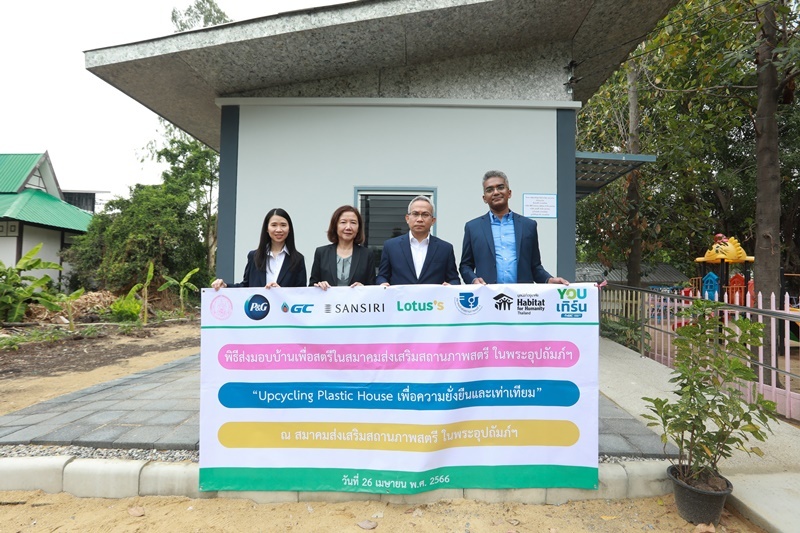
"P&G teams up with GC and collaborates with partners Sansiri, Lotus's, and Habitat Group to manage and create added value for used plastic in the "Upcycling Plastic House" project, promoting sustainability and equality. Through publicity and campaigns, they encourage the public to bring their used plastic shampoo bottles and refill pouches to donation boxes located at 35 Lotus branches to be recycled through the 'YOUTURN Platform,' which is part of creating houses from recycled materials. The houses will be delivered to the Association for the Promotion of the Status of Women under the Ministry of Social Development and Human Security. Mr. Anukul Piadkao, the Permanent Secretary of the Ministry of Social Development and Human Security, congratulates the executives on this achievement."
From 'Consume and Dispose' to 'Consume and Collect for Reuse' through the YOUTURN Platform.
It is not just the goal of any single company but a collaborative effort among leading companies in Thailand, including P&G Thailand, PTT Global Chemical Public Company Limited, Sansiri Public Company Limited, Lotus’s Thailand, and foundations in Thailand that have come together to address the issue of used plastics by returning discarded plastics through the process of upcycling to create houses.
Mr. Nithin Darbari, Managing Director of P&G Thailand Ltd., spoke about the launch of the project, stating, "Aligned with P&G's Ambition 2030, we aim to create value for the company, encompassing the entire value chain, including brands, society, and employees. Our goal is to achieve Net Zero Ambition by 2040, which covers the entire lifecycle emissions of our products and packaging, including releasing pollutants."
P&G Thailand has been implementing the "Circular Economy" system, incorporating new business models and innovations to transform consumer packaging from "consume and dispose" to "consume and collect, or reuse." The objective is to reduce virgin petrochemical plastics by 50% by 2030 while considering continuous innovation with recyclable materials or recycling processes that minimize environmental impact. For instance, we have set the goal for our hair care product brands to use a minimum of 4,000 tons of recycled plastic and achieve up to 25% PCR (Post-Consumer Recycled) content in shampoo and conditioner bottles.
Mr. Arpan Gupta, Managing Director of P&G Thailand, further emphasized, "The Upcycling Plastic House we have built is based on the idea that we want to create a greater impact for communities and society. During the last International Day of Persons with Disabilities, we donated the Upcycling Plastic House in collaboration with the government and industry partners to serve as a shelter for people with disabilities affected by COVID-19. In addition to this, P&G also piloted the Upcycling Sachet project to upcycle laminate sachet packaging. We worked with various communities to transform them into door panels. These materials were previously not recyclable, but we have added value to the products. Although it may be a small step, it is an important milestone towards transitioning into a circular economy."
Dr. Chaya Chandavasu, Executive Vice President, Sustainability at PTT Global Chemical Public Company Limited stated, "GC conducts its business based on the sustainable concept that considers the balance between the environment, society, and governance (ESG). As a global chemical company committed to creating a good quality of life, we have elevated the implementation of circular economy principles in our operations. We emphasize creating value for our products and maximizing the use of resources for the highest benefits. Our goal is to work towards achieving Net Zero by 2050”.
As a partner in this project, GC has collaborated with its partners to utilize knowledge and innovation to develop products through upcycling. These products are made from recycled materials and serve as key components of the three-part house structure, and they are; the Eco Roof and Eco Board made from Multilayers laminated milk cartons and refillable shampoo bags, while the Windows, Doors, and Decking are made from Wood Plastic Composite, which combines recycled PE plastic film with wood powder and the Eco Bricks, used for flooring and walls, are produced by mixing recycled HDPE bottles with cement, resulting in strong and durable bricks that can withstand weight, comparable to standard bricks or paving blocks used today according to industry standards.
These recycled materials have been collected and sorted through the "YOUTURN Platform," which manages the complete plastic waste cycle, including sorting, collection, transportation, recycling, and upcycling. This "End-to-End Waste Management" has been achieved through collaboration in this project. In addition to reducing plastic waste in the environment, it also creates social benefits and adds value to recycled plastic, totaling over 2,000 kilograms. This effort helps reduce greenhouse gas emissions by approximately 2,200 kilograms of carbon dioxide equivalent.
The "Upcycling Plastic House for Sustainability and Equality" project has received collaboration from partners, including Lotus’s, an intermediary between businesses and communities. Their role involves collecting donated plastic bottles and refillable plastic pouches. Mr. Phongsathorn Panprasong, Director of Consumer Goods at Lotus, stated, "Lotus operates under the sustainability strategy vision 2030; actions daily. We focus on creating sustainability through daily operations to achieve our goals for 2030, including the circular economy, which is a crucial issue. Lotus aims to reduce the amount of waste sent to landfills to zero by 2030 and to use sustainable packaging for Lotus brand products by 2025. All food and consumer goods packaging under Lotus’s brand is made from 100% recyclable materials."
In addition, as part of the sustainable packaging initiative, Lotus’s is dedicated to helping customers and the public conveniently separate and recycle waste through their branches. Since setting up the recycling service drop-off point, Lotus has collected nearly 3 million plastic and aluminum bottles, stretchable plastic weighing over 1.5 million kilograms, and more than 157 million kilograms of paper boxes and cartons for recycling. Collaborating with P&G and other partners in the Upcycling Plastic House project is another important step in advancing cooperation with government agencies, private sector organizations, and the public in establishing a closed-loop packaging system to collect and recycle used packaging. Apart from the environmental aspect, this project also creates social benefits for vulnerable groups by upcycling plastic packaging into housing. Lotus’s is delighted to support this project by allocating space in 35 branches nationwide, enabling customers and the public to participate in environmental care while supporting marginalized communities actively.
The "Upcycling Plastic House" project aims to repurpose plastic through innovative design and construction, enhancing the quality of life while promoting sustainability and equality.
Miss Chalirat Torjaras, the Marketing Director of Sansiri PLC, spoke about the role of Sansiri as the interior designer in the Upcycling Plastic House project and their collaboration, stating, "Sansiri is the first real estate company in Thailand committed to achieving net-zero greenhouse gas emissions. We are dedicated to creating environmental change and emphasizing sustainable living. Our utmost goal is to be a net-zero greenhouse gas emissions organization by 2050. The 'Upcycling Plastic House' for sustainability and equality project aligns with our mission of developing sustainable housing and utilizing resources effectively under the pledge of 'Sansiri Sustainability: Everyday Better.' We strive to improve everything every day for a better life for everyone. Additionally, we continue to advance the 'Waste to Worth: Turning Waste into Benefits' project to promote waste management, encourage understanding of waste separation from the source, and generate benefits."
In this collaboration, Sansiri has brought its expertise in interior design to create the Upcycling Plastic House, considering real-life living and functionality. They have applied the principles of Universal Design to ensure that the house is comfortable and safe for people of all genders and ages. They also emphasize natural ventilation for convenient air circulation with designated air inlet and outlet pathways. The design focuses on spaciousness and openness, reducing energy consumption. The layout and proportion of rooms are tailored to accommodate two occupants for residential purposes. Furthermore, in this design, they have also considered a flexible design approach that allows for future expansions or the implementation of the Upcycling Plastic House project in other locations or future projects."
Mr. Avirut Chotinunseth, Chairman of Habitat for Humanity Thailand stated about the collaboration and construction project: “Habitat for Humanity Thailand takes great pride and honor in serving the Thai people for over 20 years. We have a vision to assist the underprivileged and improve the Thai population's quality of life through home renovations and community development in line with international SDGs principles, aiming for sustainable outcomes."
Today, Habitat feels extremely delighted to participate in the collaborative effort in developing construction materials and promoting waste utilization in the Upcycling House project for sustainability and equality. Habitat has actively participated in the housing project to support persons with disabilities under the care of the Association for the Promotion of the Status of Women, which aligns perfectly with the vision of the foundation. It all begins with small actions, such as waste separation and utilizing waste materials like plastic waste to create impressive residential structures."
In this event, Habitat also received acknowledgments from Mr. Anukul Peedkaew, the Permanent Secretary of the Ministry of Social Development and Human Security, who expressed joy and gratitude to all participating organizations.
Mr. Anukul stated, “The Ministry of Social Development and Human Security would like to express our gratitude to all participating companies and networks, including P&G Thailand, GC, Sansiri, Lotus’s, and Habitat, for their collaboration in the Upcycling Plastic House project for sustainability and equality. This year, the Association for the Promotion of the Status of Women under the Ministry of Social Development and Human Security has taken on the responsibility of providing housing and care for those in need. This initiative is driven by the dedication and commitment of leading organizations in Thailand to give plastic new reuse purposes. Apart from helping to reduce plastic waste in the environment, this project has also created innovative and resilient living spaces suitable for habitation. The Upcycling Plastic House has had a significant positive impact on communities and society as a whole. For example, it has served as a shelter for persons with disabilities affected by the COVID-19 pandemic. Hopefully, this project will serve as a pioneering model for plastic waste separation, consumption, and upcycling, creating new materials that benefit vulnerable communities across all provinces throughout the country.
